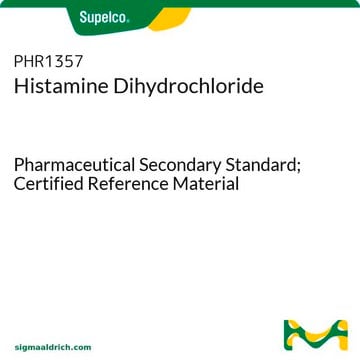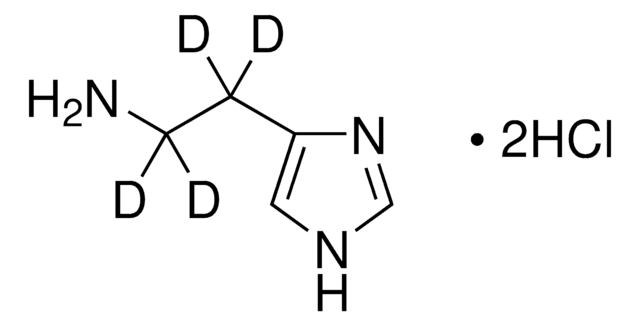H0600000
Histamine dihydrochloride
European Pharmacopoeia (EP) Reference Standard
Synonyme(s) :
2-(4-Imidazolyl)ethylamine dihydrochloride
About This Item
Produits recommandés
Qualité
pharmaceutical primary standard
Famille d'API
histamine
Fabricant/nom de marque
EDQM
Pf
249-252 °C (lit.)
Application(s)
cleaning products
cosmetics
food and beverages
personal care
pharmaceutical (small molecule)
Format
neat
Température de stockage
2-8°C
Chaîne SMILES
Cl[H].Cl[H].NCCc1c[nH]cn1
InChI
1S/C5H9N3.2ClH/c6-2-1-5-3-7-4-8-5;;/h3-4H,1-2,6H2,(H,7,8);2*1H
Clé InChI
PPZMYIBUHIPZOS-UHFFFAOYSA-N
Informations sur le gène
human ... HRH1(3269)
Vous recherchez des produits similaires ? Visite Guide de comparaison des produits
Description générale
For further information and support please go to the website of the issuing Pharmacopoeia.
Application
Conditionnement
Autres remarques
Produit(s) apparenté(s)
Mention d'avertissement
Danger
Mentions de danger
Conseils de prudence
Classification des risques
Eye Irrit. 2 - Resp. Sens. 1 - Skin Irrit. 2 - Skin Sens. 1 - STOT SE 3
Organes cibles
Respiratory system
Code de la classe de stockage
11 - Combustible Solids
Classe de danger pour l'eau (WGK)
WGK 2
Point d'éclair (°F)
Not applicable
Point d'éclair (°C)
Not applicable
Choose from one of the most recent versions:
Certificats d'analyse (COA)
Sorry, we don't have COAs for this product available online at this time.
If you need assistance, please contact Service Clients
Déjà en possession de ce produit ?
Retrouvez la documentation relative aux produits que vous avez récemment achetés dans la Bibliothèque de documents.
Les clients ont également consulté
Notre équipe de scientifiques dispose d'une expérience dans tous les secteurs de la recherche, notamment en sciences de la vie, science des matériaux, synthèse chimique, chromatographie, analyse et dans de nombreux autres domaines..
Contacter notre Service technique









